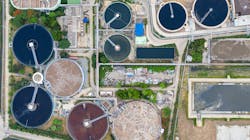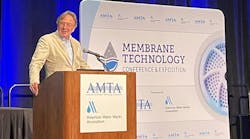The National Association of Clean Water Agencies (NACWA) has shared detailed recommendations to the U.S. Environmental Protection Agency (EPA) for opportunities to reduce greenhouse gas emissions through investment in clean water utilities.
The recommendations concern the $27 billion in the Inflation Reduction Act’s (IRA’s) Greenhouse Gas Reduction Fund (GHGRF). The association shared insights on how the financing is expected to provide greater flexibility for NACWA’s members to prioritize and advance clean energy projects, greater potential for clean water utilities to meet growing water affordability challenges for low-income and disadvantaged communities, and calls for EPA to ensure that small and medium-sized clean water utilities be made eligible for the new funding.
NACWA’s comments on the GHGRF examined an array of opportunities for reducing carbon emissions through new federal investments, including climate mitigation, clean energy projects, green infrastructure, and meeting the demands of operational and workforce challenges across the clean water sector. NACWA praised the Fund’s $8 billion in grants designed to support investments in low-income and disadvantaged communities that reduce or avoid greenhouse gas emissions and other forms of air pollution.
“NACWA members across the country have a lot at stake with EPA’s administration of the Greenhouse Gas Reduction Fund,” says Nathan Gardner-Andrews, NACWA’s chief advocacy and policy officer “We know that drinking water and clean water services represent more than 10 percent of global GHG emissions, with wastewater treatment alone contributing roughly 3.5 percent of all emissions. In terms of the global contributions to GHG emissions, these figures jump off the page for non-experts looking at our sector and underscore the essential work of our members conducting wastewater management as an energy-intensive process, making them prime candidates to receive funding from the GHGRF.”
EPA will determine which organizations and how many will be eligible to receive funding from the $20 billion available through the GHGRF general fund. An additional $7 billion will go directly to states, territories, local governments, and tribal governments. As part of its comments, NACWA is urging EPA to grant investments for clean water utility members and municipalities serving low-income and disadvantaged communities.
Excerpts from NACWA’s comments on GHGRF included the key messages below:
- NACWA’s members are public wastewater utilities that could leverage the GHGRF funds to reduce GHG emissions by increasing their energy efficiency and developing their renewable energy sources.
- Since many energy-related projects have a long pay-off period — and utilities’ primary obligation is meeting their requirements for wastewater treatment under the Clean Water Act — these projects may be a lower priority for utilities. The GHGRF could therefore be vital to realizing the greenhouse gas reduction opportunities and the ancillary environmental and community benefits available through clean water utility energy projects.
- NACWA urges EPA to specifically consider how municipal, not-for-profit clean water utilities can engage in GHGRF funding as the Agency develops its guidance.
- Types of projects include construction or improvement of anaerobic digesters for biosolids to increase production of biogas, which can be used directly by the utility, used as natural gas by external entities, or used to generate electricity



